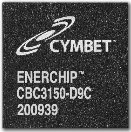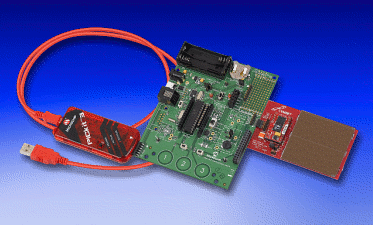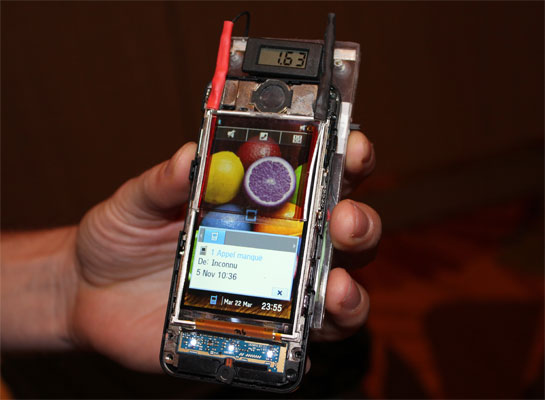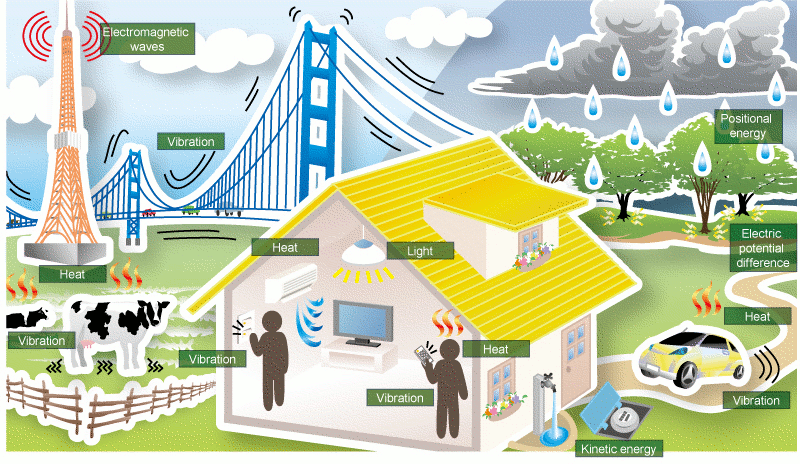Cymbet has developed rechargeable solid state batteries called EnerChip for Embedded Energy, Power Backup and Energy Harvesting. Applications include backing up Real Time Clocks (RTC), Micro-controllers (MCU) and SRAM devices. The company says “EnerChips are ideal for energy harvesting powered devices such as wireless sensors, medical devices, data loggers and remote location tracking equipment.” Those chipsets aim at replacing batteries such as CR2032 batteries that you can find in watches, calculators and other low power devices. The company emphasized three key benefits of such “batteries”: EnerChips are more than 10x smaller than non-rechargeable coin cell batteries EnerChips last 3x longer than conventional coin cell batteries EnerChips are less expensive to use than conventional coin cell batteries or super caps. The price starts at 20 US cents in volume quantities. You can watch the promotion video below for an overview of those chips. Cymbet shows a lot of mobile phones in their video, […]
Energy Harvesting Development Kit by Microchip Technology
The XLP 16-bit Energy Harvesting Development Kit is a development platform for realizing energy harvesting applications powered by Microchip nanoWatt XLP PIC MCUs which are suited for low power applications with sleep currents down to 20nA, active mode currents down to 50uA/MHz, code execution efficiency, and multiple wake-up sources. The power for the kit is supplied by Cymbet’s EVAL-08 Solar Energy Harvester which features a solar panel suitable for use with indoor or outdoor light. The XLP kit enables rapid prototyping of low power applications such as RF sensors, temperature/environmental sensors, utility meters, remote controls, security sensors and more. For software development and programming, the kit includes the PICkit 3 programmer/debugger for use with the Microchip’s free MPLAB™ Integrated Development Environment. Microchip also provides XLP 16-bit Energy Harvesting RF Demo Code in C language (The file is a Windows Executable, but it’s just an executable compressed file so it can […]
Wysips Transparent solar charger built into displays
Wysips, a company based in the south of France, developed a thin transparent photovoltaic film that can be used to charge smartphones, e-book, tablet and even laptop. They were at CTIA 2011 and were interview by laptopmag. Their transparent photovoltaic strip is 100 micrometer thick and can be used with touchscreen and 3D displays. It can provide 250mW for smartphone by continuously charging the device (6 hours of outdoor light) and possibly removing the need for charger. The cost for smartphones would be 1 USD, which could potentially be offset by a smaller battery. They are currently working with handset manufacturer and expect products using their technology to hit the market within 12 months. The next version due in 2012 should provide enough power for 30 minutes of talk time after one hour of charging. Jean-Luc Aufranc (CNXSoft)Jean-Luc started CNX Software in 2010 as a part-time endeavor, before quitting his […]
Battery-less embedded devices with Power Harvesting
Embedded systems without batteries nor connection to the mains, is that possible ? The answer is Yes!. For ultra low-power devices, Power Harvesting (aka Energy Harvesting) may be an option. By harvesting the energy from vibration from people walking or cars crossing bridges, automobile heat, broadcasting waves, light, wind, etc.. it is possible to capture enough energy to power very small devices such as wearable electronics and wireless sensor networks. The illustration below show the multitudes of tiny sources of energy around us. Please refer to the table below to see what amount of energy might be harvested depending on the source. Energy Source Examples Energy per unit area Vibration Walking, motors, bridges 10-3 to 10-4 W/cm2 Light Lighting, sunlight inside rooms 10-4 W/cm2 Heat Body heat, vehicle waste heat 10-5 W/cm2 Electromagnetic waves Broadcasting, wireless LAN emissions 10-6 W/cm2 The two main advantages of devices that can be powered […]






